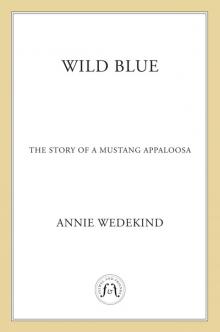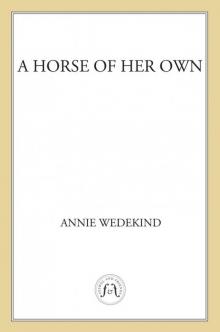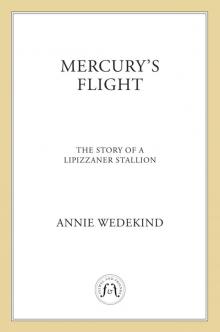- Home
- Annie Wedekind
A Horse of Her Own
A Horse of Her Own Read online
For Mum and Dad
… and for Araby (my Lily)
Table of Contents
Title Page
Chapter 1 - The Beginning of Summer
Chapter 2 - Worry
Chapter 3 - The Nutty Knight
Chapter 4 - The First Long Night of Six (Long?) Weeks
Chapter 5 - Divided Up
Chapter 6 - Triumphant Poop
Chapter 7 - Nighttime at the Barn
Chapter 8 - Good Morning, Heartache
Chapter 9 - Susan’s Big Idea
Chapter 10 - The Royal Ukrainian Cavalry
Chapter 11 - High Fences–and Tempers
Chapter 12 - Jane’s Big Idea
Chapter 13 - A Spy and a Special Delivery
Chapter 14 - What Jessica Didn’t Say
Chapter 15 - Stormy Weather
Chapter 16 - Secret Agent Man
Chapter 17 - Robin’s Ride
Chapter 18 - Sunday, Part One
Chapter 19 - Sunday, Part Two
Chapter 20 - Sunday, Part Three
Epilogue - And Last … the Mystery Horse
Note
Copyright Page
Chapter 1
The Beginning of Summer
There was no doubt that Alyssa Taylor was an excellent rider. Slim and poised, with a straight, relaxed back and lower legs like iron, she had a casual way of sitting on a horse like it belonged to her, as if she were favoring it with her seat and hands. This easy dominance was of a piece with the rest of her life—her tanned good looks and mature figure, her super-low-cut jeans with perfectly frayed cuffs, her expensive school, and her natural popularity.
As she watched Alyssa canter her dainty Arab mare, Ariel, over a combination jump, Jane Ryan admitted to herself that, as she’d been for so many years, she was still jealous. It was impossible not to be, she thought, unless you were already in Alyssa’s inner circle of friends who rode at Sunny Acres farm. Jane had ridden here since she was eight, but the following six years of summer camp and Saturday lessons had not brought her any closer to the chosen group. She had always been steady Jane, willing to stay late to walk the horses and muck out the stalls, just for the chance to spend more time at the stable, and, of course, to ride the school horses since she didn’t board or lease a horse of her own.
Luckily, one of these school horses was Beau (pronounced “boo”), and Jane thought he was the best horse in the world. She often allowed herself to pretend that he really was her own—a fantasy all too easily burst when Beau was given over to another girl to ride. But now, as she watched Alyssa and Ariel sail over the last jump, Jane patted Beau’s strong brown neck and whispered to him, “As long as we’re together, I’m happy as a clam, I promise.” Beau flickered his ears, listening, and stamped his hoof, as if he agreed with her.
It had been a fine lesson. Jane had worried that Beau would tire early in the humid late-May heat, but he was in a particularly good mood this morning, lengthening his fluid strides as she asked him to stretch out his trot, and arching his neck rather grandly as he went on the bit without a fuss. Some days he simply pretended not to understand what she meant when she gathered the reins and gently urged him to lower his head. Though his nature was gentle, his spirit was independent, and he was certainly no “push button,” as the horses who would do anything their riders asked were called. Jane liked the challenge and liked that Beau kept her on her toes. Still, she’d ridden him for so many years that she knew his repertoire of moods and could respond accordingly.
Today, their trainer, Susan McCormick, had noticed this. “Jane,” she’d called out from the center of the ring, “we’re going to have to find you a new horse to ride—you and Beau are starting to look like a centaur. You know each other so well, it’s hard to tell you apart.” It was a typical Susan compliment—accurate, nice to hear, but with a warning attached to it. Her trainer had no qualms about separating a rider from her favorite horse if she felt they were no longer learning from each other.
Susan was one of the best hunter-jumper trainers in Kentucky, and Jane felt very lucky to work with her. She reminded herself of this as she watched Alyssa finish the course flawlessly and knew she had a tough act to follow. Ariel, a glossy light chestnut with a beautiful dished face and a high-sailing, cream-colored tail, had a delicacy and quick action that looked glorious in the ring, and Alyssa pushed her hard, willing her through a perfect course.
“Jane, take Beau next, please,” Susan said, and her face was stern as it always was when she watched her riders. Jane brought Beau to a canter and looked toward the first jump, a simple cross-rail. She counted strides under her breath, and Beau took the jump neatly. “Good release!” Susan shouted. “Now look ahead to the next one.” Jane guided Beau around the turn, deepening her seat as he had to shorten his stride, and he glided over the high oxer with no difficulty. Beau was interested now, and he swished his tail and pricked his ears in anticipation of the combination. “Slow him down a little, keep him steady,” Susan called, and Jane tightened her reins and talked soft nonsense to her horse. He flickered his ears back to her and settled into his stride, cruising over the two jumps with the cocky ease that Jane loved in him.
As soon as he landed, Jane looked over her left shoulder to the last jump, which, at a little more than three feet, was also the highest—the coop. It was only her second time jumping it, and its triangular bulk, wide at the base, narrow at the top, loomed ominously at the end of the ring. She eased her reins and let Beau gather speed, trying not to convey any hesitation through her seat and hands. Beau swayed a little out of his line as he neared the jump, and Susan shouted something that Jane couldn’t hear. Her heart raced and her breath came quickly as they took the last three strides. She felt Beau gathering himself underneath her, and she rose in her stirrups, staring straight between his ears, looking anywhere but at the weather-beaten green hulk that they were now sailing over. Beau landed, snorted, shook his head, and Jane laughed with relief, patting his neck and praising him as he spun out his canter and returned to a trot. “Good boy!” she said. “What a good boy!”
“Nicely done,” was all Susan said when she and Beau rejoined the other riders in the center of the ring. It was all that Jane needed to hear.
There were seven other girls in the Advanced group with whom Jane had ridden for years—they’d all been promoted from Intermediate the previous summer. But last Saturday, she’d overheard Susan say that the group had gotten too large. For camp, which started in two weeks, she’d divide them into Advanced I and Advanced II. The stronger riders would be in Advanced I, and Jane looked at the girls around her, wondering who would make the cut. Alyssa, certainly. Then there was Jennifer, a petite brunette who was Alyssa’s best friend. Her parents had bought her big gray gelding, Thunder, last summer, and he’d already placed well in several autumn shows.
Jane wasn’t as worried about Liz and Shannon—she’d been surprised when Liz had been promoted to Advanced in the first place, and suspected that it had more to do with her horse than with her riding skill. Lady Blue was a perfect example of a push button—her training masked Liz’s laziness; she could go on autopilot with little input from her rider. She had a sweet temperament as well, and Jane worried that eventually she would coarsen under the indifferent hands of her owner, especially since Liz had missed several weeks of lessons over the winter and early spring, forgoing the chilly farm for a series of unspecified “school projects.” Shannon, on the other hand, had been a strong rider until the past March, when she’d had a nasty fall off her skittish bay, Bebop. He’d shied before a jump, and Shannon was thrown into the rails, spraining her wrist. It wasn’t a serious injury, but Shannon seemed to lose her nerve. She refused to get back on Bebop, and when
she finally did, three weeks later, she was tentative and easily spooked by his slightest hesitation. It did not bode well for her chances of getting into Advanced I.
There were two girls who Jane wished she would be able to ride with this summer—Robin and Jessica. Robin was her best friend, a quiet girl with large hazel eyes and long, light brown hair who didn’t seem to realize how pretty she was. Because she was lovely, and her family was wealthy, Robin was automatically invited to all of the popular girls’ activities, from after-lesson swimming parties at Jennifer’s house to movies, shopping expeditions, and Friday night private-school mixers that Jane heard about on Saturdays. But Robin rarely went—her parents were strict but, more than that, she seemed to prefer the company of horses and books, just like Jane. So “the clique,” as Jane and Robin called them, had pretty much decided she was hopeless, and Robin didn’t care one bit. Jane never told her that she couldn’t understand why Robin wouldn’t want to be a part of this bright, shining group with their late parties and their wild older brothers who took them out in the new cars they got for their sixteenth birthdays. Some of them even had boyfriends, though they were all only thirteen or fourteen. Jane was embarrassed to tell Robin how much she wanted to be a part of what Robin could be, if only she chose.
Jessica was another story. She was a funny, frank girl who went to the same school as Alyssa, Jennifer, and Robin and happily accepted her natural place with the clique. But although the other girls treated Jane with indifference or condescension, Jessica was, remarkably, often nice to her. She seemed to like Jane, and she was brave enough to show it when the mood struck her. They were not close, but Jane could count on Jessica to be friendly and even to sometimes include her in the gossip sessions after the lessons. She wasn’t particularly loyal, but she didn’t pretend that Jane didn’t exist, or comment on the fact that Jane went to a backwater all-girls Catholic school, or that her family lived in a ramshackle house in the middle of downtown Louisville, far from the plush suburban villages nearly all the others called home.
“Time to go in,” Susan said, and the riders turned their horses toward the barns. Jane stroked Beau’s mane and dropped her feet from her stirrups, letting him walk with a long, relaxed rein back to the stables.
“Nice course,” said a voice on her left. “For a school horse.”
Jane looked up to meet the eyes of the girl she feared would be her biggest competition for a slot in Advanced I—Emily Longstreet. A stocky, athletic girl with an oddly ill-matched, narrow face, she was an aggressive rider and vocal about her own abilities. This would be her second summer at the farm—her family had moved to Kentucky from Atlanta—and she was a dogged fourth wheel to Alyssa, Jennifer, and Jessica. Jane hadn’t liked her since camp last year. Besides her frequent complaints about how much cooler and more interesting Atlanta was (which, Jane noticed, Alyssa and company tired of as well) and her short temper toward both her horse, Georgia Belle, and her friends, if she felt left out or slighted, Emily also seemed to believe that being nasty to Jane was part and parcel of keeping her place in the clique.
“Hey, that rhymes, Emily,” Jane said shakily. “I didn’t know you were a poet.”
Jessica, pulling her horse, Quixotic, next to theirs, laughed. “I can think of a better subject for you, Em: ‘Oh, Matt, my heart goes splat. When I think of you, I turn to goo.’”
Jane flushed, smiling as Emily scowled, though she had no idea who they were talking about. But Emily was noticeably boy-crazy.
“That’s completely retarded,” she said coldly.
Jessica threw Emily a look of innocent surprise. “Hmmm. I don’t think poets say retarded. You might need to work on the vocab.” She turned Quixotic back toward Alyssa and Jennifer, and the triumvirate started talking about their plans for that evening, leaving Jane and Emily in an uncomfortable silence. Jane broke it by nudging Beau into a trot, pulling away from Georgia Belle.
She stopped him in the shade of the barn and dismounted, pretending to be absorbed in pulling up the stirrups, undoing his girth, and taking off the saddle and pad—she didn’t want the others thinking that she cared about their plans or about what Emily had said. But she did care, almost desperately, she thought now, both about having a horse of her own and being a part of a group. “I’m so tired of being different,” she whispered to Beau as she pulled off his bridle and he began rubbing his head vigorously on her arm. She turned, offering him her back, and he almost knocked her over with the force of his happy nuzzles. The other girls rarely let their horses do this—“Ugh,” Liz would shout at Lady Blue, “you’re making me filthy!”—but Jane loved Beau and would do anything for him, including getting a shirt full of horsehair and sweat and slobber. Riding, she often thought, was not for those afraid of a little dirt.
After walking Beau until he was cool, Jane turned him out in the big pasture behind the barn and watched as he trotted toward a group of horses swishing flies under a copse of trees by the pond. The hazy, rich green of the grass and the heavy branches of the oaks curving down over the gently sloping pasture were Jane’s ideal of beauty. She’d found a painting by Thomas Hart Benton in one of her mother’s art books and thought that he must have been painting Kentucky. When she’d told her art teacher how much she liked his work, the teacher laughed, calling her “old-fashioned.”
Maybe that’s what’s the matter with me, she thought, folding her arms over the white fence rail. Maybe I was meant to be living in the turn of the century or during the Depression or World War II. When horses were a part of everyday life, either riding them or watching their races. Man O’War, War Admiral … they were heroes, and they had Kentucky blood running through their veins. She shivered happily, picturing herself as a groom, or even a jockey, in what seemed like such an uncomplicated time. And if I’d been a boy, I wouldn’t have to worry about being popular. And I could wear one of those gray felt hats. Jane tried to picture Alyssa or Emily feeling this way and laughed out loud—at herself, at how crazy they’d think she was if she ever actually said these things.
“Did Beau just tell you a good joke?” Robin had walked up and joined her at the fence.
“No,” Jane said, “I was trying to picture Emily in a fedora and trench coat, like in Casablanca.”
“Okay, I’m not even going to ask.” Robin chuckled. “I don’t think I want to know the train of thought that got you there.”
“So only one more Saturday lesson before camp … .” Jane said, knowing Robin would understand her meaning.
“And only one more chance to be judged for which group we’ll be put in,” Robin finished. They’d discussed this endlessly on the phone all week, creating different scenarios and unlikely lucky breaks. If Emily fell … if Jennifer suddenly lost all interest in horses …
“I know who it’s going to be,” Robin said firmly. “Alyssa, Jennifer, Jessica, and you. You’re the best riders, and that’s all there is to it.”
“But what about Emily? And you? You’re a great rider.” Jane looked at her friend with concern. All of their previous conversations had ended by deciding that, somehow, both she and Robin would be in the top group.
“You know I get scared on the big jumps, and Advanced I is going to be really tough. I think I’d rather be in Advanced II.” Robin spoke with such certainty that Jane couldn’t believe her ears.
“But don’t you want to be chosen for Advanced I anymore?” she asked.
“Not if it means not having a good time. I’ve been thinking about it a lot this week, and all I really want this summer is to hang out with you, and to ride Bess and hopefully keep getting better with her. And I don’t think I will if I’m always worried about what Susan’s going to make us do next.”
“Wow” was all Jane could think of to say. She couldn’t imagine not wanting to be promoted to the top group, no matter how scary or tough the lessons were going to become. Despite her solitariness and her reluctant awareness that she wasn’t quite like the other girls, a desire to win was hardwire
d into her. She didn’t talk about her ambition except jokingly, with Robin, or sometimes with her sister, Lily, but it burned in her like a deep, sure flame. She wanted to be the best.
“Well,” she finally said, “then we’ll both have to be happy in Advanced II, because Emily is going to make it, not me. I’m the only one who doesn’t have my own horse, and it wouldn’t be fair for Susan to always let me ride Beau. They’re going to need him for other lessons. You heard Susan today—she practically said that she didn’t think I should ride him all the time. She’s probably preparing me for this summer, when I’ll have to ride whoever’s free. And I can’t exactly picture Brownie or Fleur making it over triple combinations and water obstacles.”
Robin couldn’t help laughing at the picture of two of the oldest, most sedate school horses trying to keep up with the likes of Ariel and Thunder. “Well, at least we’d get to ride together, but I’m still betting that Susan puts you in the top group,” she said loyally.
“Nope,” Jane said, affecting a breezy tone, “it’s me and Brownie and you and Bess in the minor leagues. Beau’s not my horse, and I have to stop pretending that he is.”
She smiled bravely at her friend, but she hated saying the awful truth out loud.
Chapter 2
Worry
Robin hadn’t really answered her question about Emily, and Jane knew she had reason to worry about her chances at beating her for a spot in Advanced I.
The next Friday night, she sat at the kitchen table, sketching a picture of Beau standing under the oak trees, trying to capture the half-wise, half-comical glint in his eyes. Her mother peered over her shoulder.
“Is that our hero Beau?” she asked, leaning her chin on her daughter’s shoulder.
“Mm-hmm,” Jane replied. “He’s so handsome, though, I can’t do him justice.” Handsome wasn’t really the right word for Beau, she knew. His slightly Roman nose, oversize ears, and shortish neck prevented him from being a traditionally beautiful horse, but to Jane his personality and ability, and their longtime comradeship, more than made up for what others might consider his plainness.

 Wild Blue - The Story of a Mustang Appaloosa
Wild Blue - The Story of a Mustang Appaloosa Little Prince - The Story of a Shetland Pony
Little Prince - The Story of a Shetland Pony Samirah's Ride
Samirah's Ride A Horse of Her Own
A Horse of Her Own Mercury's Flight - The Story of a Lipizzaner Stallion
Mercury's Flight - The Story of a Lipizzaner Stallion